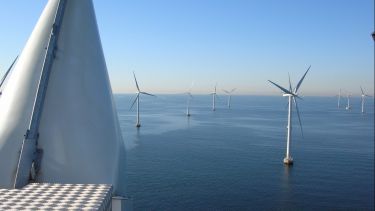Researchers from the University of Sheffield are set to develop the next generation of offshore wind turbines, which could lead to greener, lower cost electricity generation, as part of a new research hub.
- University of Sheffield is named as the academic partner for the Offshore Renewable Energy Catapult's new research hub.
- New hub is set to focus on offshore wind turbine powertrains - the gearbox and generator that enable turbines to generate electricity.
- Research aims to improve operation, reliability and performance of wind turbines - which could lead to lower cost electricity generation.
- University of Sheffield is chosen in recognition of its world-renowned expertise in electronic and electrical engineering.
The University has been named as the academic partner for the Powertrain Research Hub (PTRH), which is part of the Offshore Renewable Energy Catapult (ORE) - launched by the UK government in 2013 as part of a network of catapults in high growth industries.
Focusing on offshore wind turbine powertrains - the gearbox and generator that enable turbines to generate electricity - the new hub is aiming to improve the operation, reliability and performance of wind turbines.
The University is world-renowned for its expertise in the fields of electrical machines, power electronics, controls and energy conversion and storage and will contribute a minimum of £1.7 million to the project over five years.
It is essential to maximise this opportunity in a number of key areas including the challenge of improving powertrain component reliability and availability.
Paul McKeever, ORE Catapult's Head of Strategic Research
This complements the £700,000 funding from the ORE Catapult with the collective contributions supporting 12 PhD students and a number of postdoctoral research associates.
The new research hub also enables industry to access to the University of Sheffield's extensive testing facilities in addition to ORE Catapult's 1, 3 and 15 MW powertrain test facilities at its National Renewable Energy Centre in Blyth.
The Powertrain Research Hub (PTRH) will support the development of future technologies for larger turbines and research solutions for improving turbine reliability and availability.
The hub's key objectives are:
- Reliability improvement and advanced test methodologies.
- Advanced health condition monitoring and prognostic technologies.
- Development of next generation powertrain components for larger-sized wind turbines.
- Research conducted as part of the hub will also focus on minimising human interventions throughout the life of the wind turbine - repair work that can be hazardous for engineers to carry out.
Professor David Stone from the University of Sheffield's Department of Electronic and Electrical Engineering, who is also the Scientific Director of the new Hub, said, "University of Sheffield sees working with ORE Catapult as a fantastic opportunity to apply its cutting-edge research ideas to support the rapidly expanding field of green energy generation solutions.
"The synergies brought about by the Powertrain Research Hub will not only bring benefits for the University and the offshore wind industrial sector, but consumers as a whole through higher reliability, lower cost electricity generation."
Paul McKeever, ORE Catapult's Head of Strategic Research, added, "With industry moving towards larger wind turbines, we have an opportunity to significantly contribute to reducing the cost of turbine technology. It is essential to maximise this opportunity in a number of key areas including the challenge of improving powertrain component reliability and availability.
"By developing the next generation of powertrain components, and improving their lifespan, we can significantly reduce the related operations and maintenance costs and subsequently minimise the number of human interventions for potentially dangerous turbine repair work at sea."
Researchers in the University of Sheffield's Department of Electronic and Electrical Engineering are respected around the world for their many important contributions in the field of electronic and electrical engineering. They are known for turning brilliant ideas into advanced technology.
From communications, electrical machines and drives to semiconductor materials and devices, researchers in the department are working on some of the world's biggest electronic and electrical engineering challenges.
University of Sheffield researchers are also renowned for their pioneering energy research that is changing the way we make and use energy.
For more information on the Offshore Renewable Energy Catapult, visit ore.catapult.org.uk.
More about the University's Department of Electronic and Electrical Engineering
For further information contact:
Sean Barton
Media Relations Officer
University of Sheffield
+44 114 222 9852
s.barton@sheffield.ac.uk

